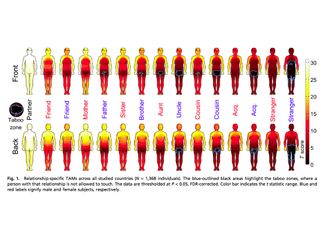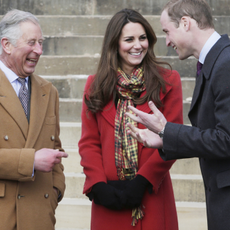This Body Map Shows You Exactly Where People Are Comfortable Being Touched - Just In Case You Weren't Sure
The study by Oxford University is very revealing

The study by Oxford University is very revealing
An Oxford University study has revealed exactly where people do and don't like to be touched - and the results may surprise you.
The research, compiled from data from more than 1,300 people's responses, showed that men were far more comfortable with physical contact than women. The respondents were from five different countries, and had to colour in areas of the body that they would allow various people to touch.
The majority of women said they'd only be comfortable with male strangers touching their hands, with any other areas being out of bounds, while men were more comfortable with female strangers touching any part of their body - even their genitals.
But while men were happier for female strangers to touch them literally anywhere on their body, they were also more uncomfortable than women at being touched by friends. While women were generally happy with friends of both sexes touching most parts of their bodies, men were considerably more uncomfortable with similar types of physical contact.
See the results below...

The study, which is the biggest ever conducted into physical contact, shows that both men and women were uncomfortable with people touching their face - suggesting that the European greeting of kissing someone on both cheeks may be falling from grace.
Marie Claire Newsletter
Celebrity news, beauty, fashion advice, and fascinating features, delivered straight to your inbox!
Researcher Julia Suvilehto from Aalto University, which conducted the study alongside Oxford, said: 'The results indicate that touching is an important means of maintaining social relationships.The touch space map is closely associated with the pleasure caused by touching.
'The greater the pleasure caused by touching a specific area of the body, the more selectively we allow others to touch it.'
Professor Robin Dunbar, who led the study, told The Telegraph touching appropriately is all about context. 'We interpret touch depending on the context of the relationship. We may perceive a touch in a particular place from a relative or friend as a comforting gesture, while the same touch from a partner might be more pleasurable, and from a stranger it would be entirely unwelcome.
'I would guess that kissing a stranger on the cheek would still make a lot of people uncomfortable. But with modern life it has become as conventional as a handshake and so no longer seems overly-familiar, especially if you have been introduced by a friend.'
He also said that in the social media age, people are physically seeing and touching each other less frequently, which could have a knock-on effect on the quality of our relationships.
'Even in an era of mobile communications and social media, touch is still important for establishing and maintaining the bonds between people,' he said, 'We know that if people don’t see each other the quality of that relationship diminishes and your best friend will bump down to just an acquaintance. Social media does allow you to slow that decline but it doesn’t stop a relationship failing. You really need to see the whites of their eyes.'
Do you agree with the findings of the body map? Let us know @marieclaireuk
The leading destination for fashion, beauty, shopping and finger-on-the-pulse views on the latest issues. Marie Claire's travel content helps you delight in discovering new destinations around the globe, offering a unique – and sometimes unchartered – travel experience. From new hotel openings to the destinations tipped to take over our travel calendars, this iconic name has it covered.
-
 Zendaya's reaction to awkward kissing question during Challengers interview has gone viral
Zendaya's reaction to awkward kissing question during Challengers interview has gone viral'Uncomfortable' doesn't begin to cover it
By Iris Goldsztajn
-
 Prince William feels 'immense responsibility' amid Kate and Charles cancer diagnoses
Prince William feels 'immense responsibility' amid Kate and Charles cancer diagnosesHe has a lot on his plate
By Iris Goldsztajn
-
 Taylor Swift just teased a 'timetable' for her new album release
Taylor Swift just teased a 'timetable' for her new album releaseThe wait is torture
By Iris Goldsztajn